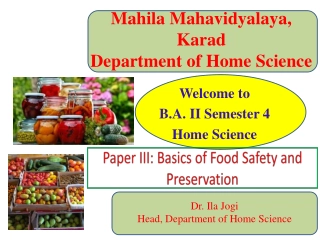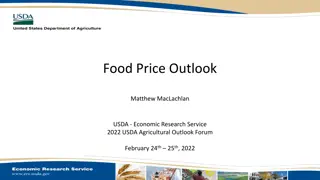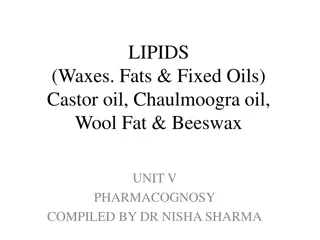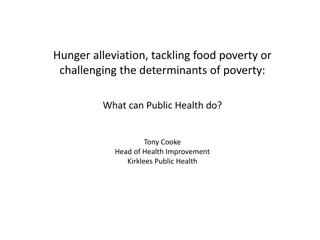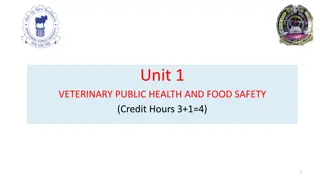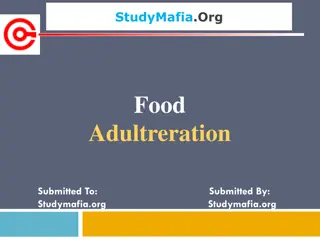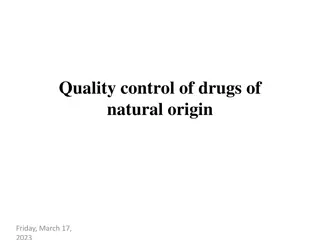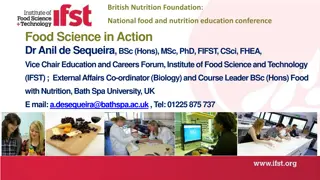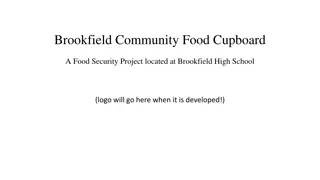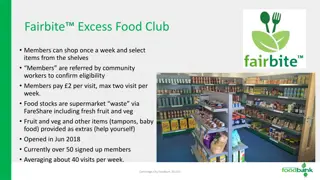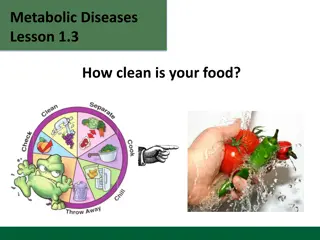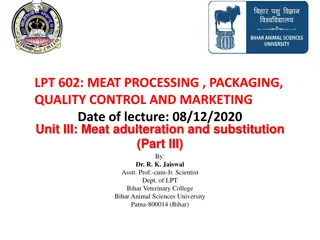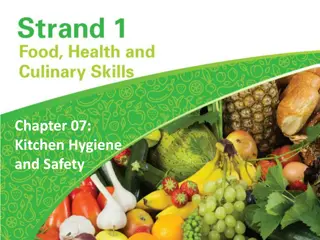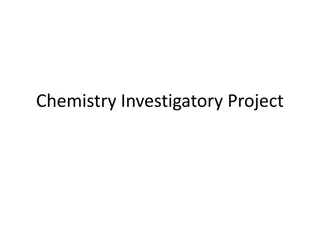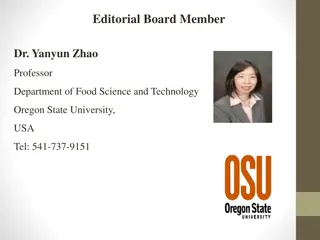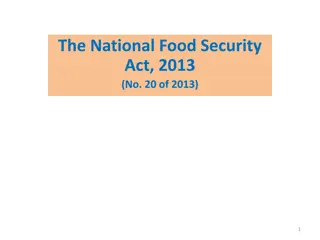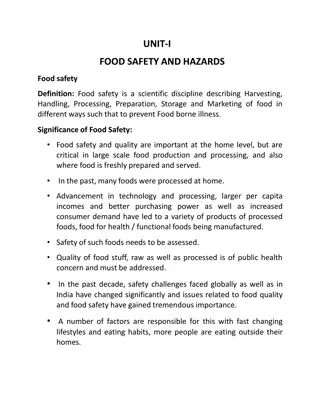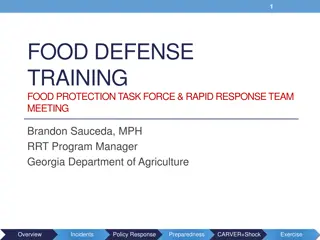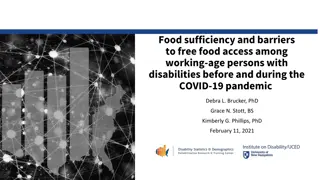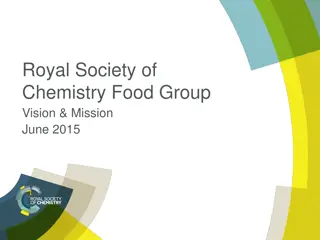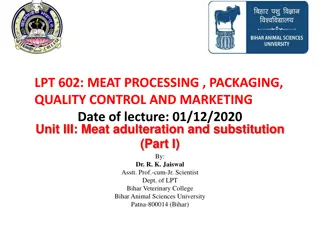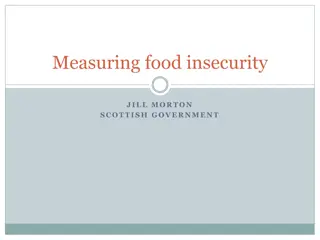BSc Food Science & Human Nutrition Programme Overview
This BSc Food Science & Human Nutrition programme at Maynooth University offers a comprehensive understanding of nutrition, biology, and chemistry as applied to food. With a focus on ingredients, production, products, and nutrition, students explore various aspects of food science including food saf
6 views • 12 slides
Comprehensive Guide to Food Safety and Preservation in Home Science
Explore the world of food safety and preservation through this detailed course in Home Science at Mahila Mahavidyalaya, Karad. The course covers topics like basics of food safety, principles of food preservation, methods of food preservation, and practical sessions on preparing various food items. G
1 views • 6 slides
Transforming School Food Education for Health and Wellbeing
The Food Education Roadmap aims to prioritize health and wellbeing through food for students, promoting a culture of healthy eating, wellness, and lifelong habits. It emphasizes access to healthy food, nutrition education, experiential learning, and community involvement. The initiative requires col
3 views • 12 slides
The Slow Food Movement: A Revolution in Food Culture
The Slow Food Movement, initiated by Carlo Petrini in 1986, challenges the fast food industry and advocates for mindful consumption. Petrini's vision promotes awareness of food sourcing, support for sustainable practices, fair compensation for producers, and the enjoyment of nutritious, flavorsome f
1 views • 17 slides
Role of Microorganisms in Food and Industry
Microorganisms play a crucial role in the food and industrial sectors, both benefiting and causing harm. They are involved in processes such as organic compound transformation, fermentation, and food production. While beneficial microorganisms contribute to the creation of various useful food produc
5 views • 44 slides
How are plant essential oils valuable as functional ingredients
Food Research Lab is one of the leading food industry consultants and offers various food production services. We provide food production and food manufacturing consultancy services to food, beverage and nutraceutical companies. Primary food production involves everything from food procurement, inve
9 views • 12 slides
Takeout Food In Orlando
Takeout food in Orlando. It's known for being live\u00adly, teeming with zest and a host of food on the\u00ad go to cater to any palate. Looking for high-end tre\u00adats, food from around the globe, or just some good old comfort food? Orlando's got you cove\u00adred. From real-deal Me\u00adxican ta
2 views • 4 slides
Adulteration in Drugs and Food Industry
Adulteration is the deceptive practice of substituting original substances with inferior or harmful ones. Deliberate and accidental adulteration can lead to health risks and financial gains. Different types of adulterants, reasons for adulteration, and ways to prevent it are discussed in this inform
1 views • 34 slides
Overview of Food Price Trends and Consumer Expenditures in the US
The presentation highlights the consumer spending on food, food price trends over time, 2021 food prices, and forecasts for 2022 in a historical context. It emphasizes that U.S. consumers spent 12% of their expenditures on food in 2020, aligning with historical averages. Food price inflation remaine
1 views • 21 slides
Lipids: Waxes, Fats, and Fixed Oils
Lipids are organic compounds like waxes, fats, and fixed oils found in plants and animals. Fixed oils are reserve food materials, while fats are solid at higher temperatures. These substances are esters of glycerol and fatty acids, with various components giving them unique properties and flavors. C
0 views • 20 slides
Addressing Food Poverty and Hunger: Public Health Initiatives
Public Health plays a crucial role in combating food poverty by addressing factors such as lack of access to healthy food, inadequate cooking skills, and economic limitations. Issues like irregular work schedules, limited nutritious food choices, and stigma associated with food insecurity further co
1 views • 13 slides
Food Safety and Toxicology: Adulterants and Detection Methods
Food adulteration can have harmful effects on health by altering the natural composition of food. Learn about the risks of adulterants, their effects, and methods for detecting them in food products. Ensuring food safety is crucial to prevent toxic compounds and nutrient deficiencies that can impact
0 views • 15 slides
Food Equipment Usage Guidelines for Safe Food Handling
Enhance your knowledge on using equipment for making food with proper safety procedures. Learn about essential points like wearing protective gear, checking hot food temperatures, food safety principles, and sanitization requirements. Understand machine settings, food temperature checks, and serving
2 views • 22 slides
Veterinary Public Health and Food Safety: Ensuring Safe Consumption
Introduction to food safety and hygiene, emphasizing the importance of controlling hazards to ensure food fitness for human consumption. Discusses the responsibilities of ensuring food safety and suitability along the food chain, as well as the general principles of food hygiene such as primary prod
2 views • 15 slides
Food Adulteration: Causes, Methods, and Prevention
Food adulteration is the deceptive practice of adding substandard or harmful substances to food products for economic gain. This unethical practice reduces the nutritional value of food and poses serious health risks to consumers. Causes include business strategies and lack of proper food knowledge,
1 views • 15 slides
National Food Reserve Agency (NFRA): Enhancing Food Security in Nigeria
The National Food Reserve Agency (NFRA) under the Federal Ministry of Agriculture & Water Resources plays a crucial role in addressing agricultural production, storage, and marketing challenges in Nigeria. With a vision to ensure sustainable food access for all Nigerians and become a global food pro
2 views • 30 slides
Best Practices for Food Preparation to Ensure Food Safety
This chapter highlights essential practices for prepping food to prevent cross-contamination and time-temperature abuse in a food service setting. Topics covered include safe methods for thawing food, cooking temperatures, microwave cooking, informing consumers of risks, requirements for partially c
3 views • 25 slides
Quality Control of Drugs of Natural Origin
This chapter delves into the various methods of detecting adulteration in crude drugs, with examples and evaluation techniques to preserve their quality. It discusses deliberate and unintended forms of adulteration, their detection methods, and reasons behind deliberate adulteration. The content emp
3 views • 12 slides
Food Science and Technology in Modern Society
Delve into the world of food science and technology with insights on what scientists do, the importance of understanding food, definitions of food science and food technology, factors affecting food spoilage, and traditional and modern food processing technologies. Gain knowledge on testing hypothes
2 views • 22 slides
Food Safety Practices in Service Industry
This chapter focuses on the essential food safety practices in the service industry, covering topics such as time and temperature requirements for holding food, ways to prevent time-temperature abuse and cross-contamination, minimizing bare-hand contact with food, preventing staff and customers from
1 views • 26 slides
Brookfield Community Food Cupboard: Addressing Food Insecurity at Brookfield High School
Brookfield Community Food Cupboard is a project aiming to provide food security to individuals and families in the Riverside Park/Hunt Club area, including students and families served by Brookfield High School. The initiative seeks to supplement existing food security programs by offering a day's w
0 views • 11 slides
Fairbite Excess Food Club: Addressing Food Insecurity in Cambridge City
Fairbite Excess Food Club in Cambridge City provides a weekly shopping opportunity for members referred by community workers, offering supermarket waste items and extras like fresh fruit, vegetables, tampons, and baby food. With successful system operations and a growing membership, the club faces c
0 views • 5 slides
Food Safety and Preventing Food-borne Illness
This lesson focuses on the importance of food safety, addressing how clean our food is and at what points safety can be compromised. It delves into common types of microbes that contaminate foods and explores ways in which food safety can be compromised. The activity involves case studies on food sa
0 views • 11 slides
Mastering Good Food Hygiene and Storage Practices
Understanding food spoilage causes, common food-poisoning bacteria, conditions for bacterial growth, ways to prevent food contamination, safe food handling practices, HACCP concept, types of perishable foods, importance of proper food storage, packaging materials for food, and recognizing signs of f
2 views • 27 slides
Adulteration of Crude Drugs
Adulteration of crude drugs involves substituting the original substance with similar-looking but chemically inferior ones. This deceptive practice can be intentional or accidental, driven by factors like profits, scarcity, or high prices in the market. Different types and reasons for adulteration a
0 views • 36 slides
Meat Adulteration: Chemical Methods for Detection
Explore the chemical methods used in meat processing to detect adulteration, including tests for glycogen content, linoleic acid levels, iodine value, refractive index, and myoglobin content in different animal species. Learn how these tests help identify potential adulteration and ensure meat quali
0 views • 7 slides
Kitchen Hygiene and Food Safety
Kitchen hygiene and food safety are crucial to prevent food spoilage and food poisoning. Factors like enzymes, micro-organisms, and oxygen can lead to food spoilage, while food poisoning occurs when pathogenic bacteria multiply in consumed food. Practicing proper hygiene, storage, and preparation me
0 views • 27 slides
Investigation on Detection of Food Adulteration in Chemistry
This chemistry investigatory project focuses on detecting food adulteration through various experiments. Experiment-1 aims to detect adulterants in fat, oil, and butter, while Experiment-2 investigates adulteration in sugar. Experiment-3 aims to detect adulterants in chili powder, turmeric powder, a
0 views • 18 slides
Dr. Yanyun Zhao - Food Science & Technology Professor at Oregon State University
Dr. Yanyun Zhao is a prominent Professor at Oregon State University specializing in food science and technology. With a strong research focus on food processing technologies and food safety, Dr. Zhao has made significant contributions to the field. Her expertise in value-added food processing, antim
1 views • 16 slides
National Food Security Act, 2013 Overview
The National Food Security Act, 2013 (NFSA) aims to ensure food and nutritional security for all by providing access to adequate quality food at affordable prices. It includes provisions for hot cooked meals, food security allowance, social audit, nutritional support for children, and various monito
1 views • 15 slides
Importance of Food Safety in Modern Food Production
Food safety is crucial in modern food production to prevent foodborne illnesses. With advancements in technology and increased demand for processed foods, the need to ensure the safety and quality of food has become paramount. Factors affecting food safety include poor hygiene practices, contaminate
1 views • 30 slides
Food Defense Training and Rapid Response Team Meeting Overview
Food Defense Training and Rapid Response Team Meeting provides insights into food security, food defense, and food safety to protect against intentional and unintentional contamination incidents. The presentation delves into incidents, policies, responses, and preparedness, emphasizing the importanc
1 views • 24 slides
Food Justice and Insecurity: A Comprehensive Overview
Food Justice Primer provides insightful definitions and discussions on key concepts such as food justice, food insecurity, food sovereignty, and food deserts. It highlights the need for equitable sharing of benefits and risks in the food system, aiming to transform current disparities and inequities
1 views • 49 slides
Food Sufficiency and Barriers to Free Food Access Among Working-Age Persons with Disabilities Before and During COVID-19 Pandemic
Working-age persons with disabilities face economic vulnerability and higher chances of living in food-insecure households. This study explores food sufficiency and barriers to accessing free food during the COVID-19 pandemic. Data was collected through an online survey, revealing insights into food
2 views • 14 slides
Royal Society of Chemistry Food Group Vision & Mission Summary
The Royal Society of Chemistry Food Group aims to lead, promote, and disseminate the understanding and importance of chemistry in food. Their vision is to enhance food and nutrition security through advancing the chemistry of food ingredients. They strive to engage with various communities to promot
2 views • 4 slides
Meat Adulteration and Substitution in Food Processing
In meat processing, there is a risk of substituting lower quality meats for higher quality ones to deceive consumers. Differentiating between animal meats is crucial, especially in minced or sausage forms. Horseflesh, with its high glycogen content, presents a unique challenge. Methods for meat spec
0 views • 7 slides
Food Insecurity Measurement in Scotland
The report emphasizes the importance of understanding and addressing food insecurity effectively in Scotland. It discusses the dignity in ending hunger, the rights to nutritious food, and the limitations of emergency food aid. The Food Insecurity Experience Scale is highlighted as a tool for measuri
0 views • 7 slides
Food Costing and Pricing in the Food Industry
Explore the factors influencing food costs in the restaurant industry, including the importance of food cost percentage, pricing strategies, and impact of location on food prices. Learn about managing food costs, controlling waste, and optimizing profitability through effective cost analysis and men
1 views • 12 slides
Efficiency and Quality in Computational Food Systems
Addressing challenges in the food industry with a focus on safety, waste reduction, and improving quality. The project aims to utilize computational methods to enhance food provenance, efficiency, and effectiveness, ultimately leading to a more sustainable and secure food system. Key motivations inc
0 views • 25 slides
Household Food Insecurity in Canada and the UK: A Study
This study explores household food insecurity and food bank usage in Canada and the UK, shedding light on the initiation of food banks, trends in food bank use, and the demographics of individuals relying on food banks. It delves into the construct of food insecurity, potential manifestations, and t
0 views • 45 slides

